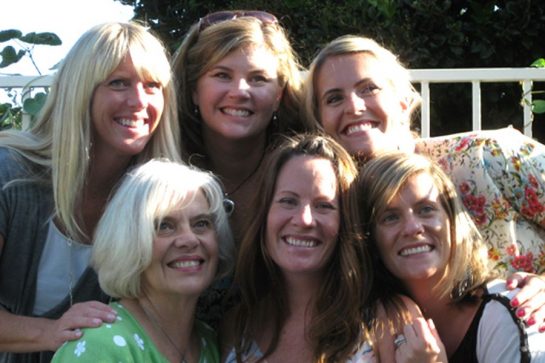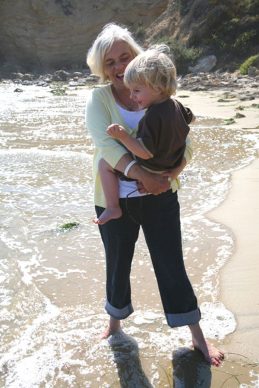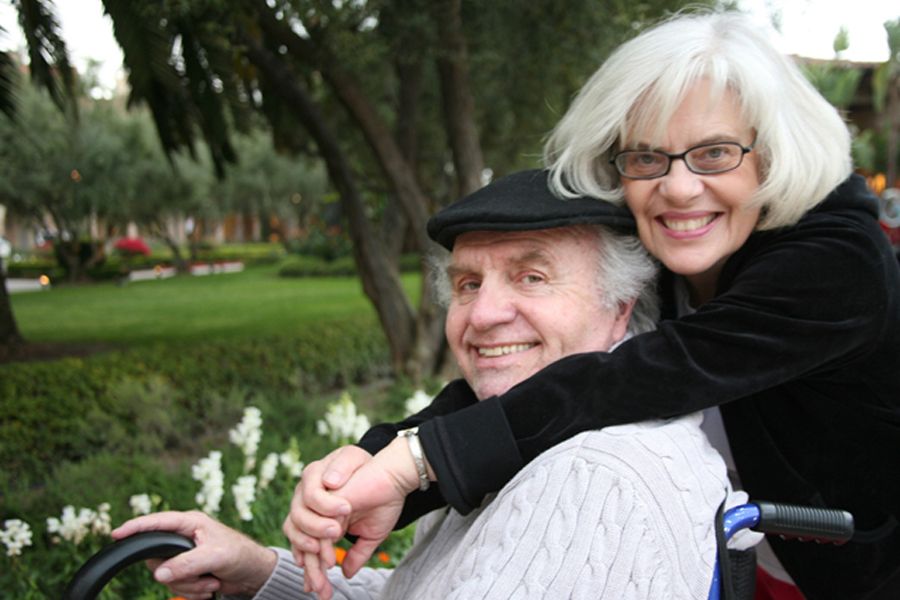West Lafayette, IN
Catherine Humphrey was married to her first husband for 28 years. Parents of six children, Catherine and her husband served together as mission presidents in Brazil when she was 32 years old. Their marriage slowly dissolved after she learned that her husband had embezzled from clients and been disbarred. As a single mother, she went back to school, completing a master’s degree and a Ph.D. Thirteen years after marrying her second husband, he was diagnosed with an acute brain disease that has slowly robbed him of cognition and function.
How did you find out that your first husband was no longer the man you’d married?
We had the best of everything—the best house, the neatest children, we lived in Glendale, California—a wonderful community where we’d both grown up. My husband was an attorney in partnership with other LDS attorneys. We had everything we could wish for. My husband was called as a mission president when he was 40 years old and I was 32. By the end of the marriage, we had been married for 28 years and had six children.
Things started unraveling when my husband came home one day and said, “There’s no money,” and I thought, “What is he talking about?” During that week we also received a knock on the door and I learned our house was in foreclosure.
At that time, my first husband was serving as a bishop. It was awful. He was released soon after—he only served eighteen months. I learned that he had been fired years earlier from the law firm and he hadn’t told me; instead he told me he was opening up a branch of the law firm in Glendale and I believed him. Every day, he went to an office he’d rented and embezzled money. He became emotionally and physically abusive to me, our children, and my extended family.

Catherine with some of her children
During this experience, I learned that you cannot effect change in other people. I prayed often and church leaders, his former senior law partner, and professionals attempted to counsel him. I wanted to work with him if there was a change in behavior, but there was no change, not even an acknowledgment of, “I’m sorry,” or “I did wrong.” Nobody knew why he did what he did but it was so hurtful and scary.
After we divorced, my first husband sued me frequently on made-up charges. Once he sued me in three courts on the same day. If you’re sued, a process server comes to your door. So I’d have to pay a lawyer to answer the summons. He’d serve me summons on Valentine’s Day, on Mother’s Day, even on my birthday. When he died, he was unrecognizable to me in his coffin. He had become a different person.
What was it like to unexpectedly become the sole provider and return to school?
The day my husband told me there was no more money, I said, “Well, should I get a job?” And he said, “I think you’d better.” He never provided for our family again. I’d never worked before but I had my teaching certificate. So the next day I went to the Pasadena Board of Education and said, “I need to work as a substitute teacher immediately.” They weren’t hiring full-time teachers so I said, “I’ll teach anything, but I need to work every day.” And I worked every day as a substitute teacher. There was never a day I wasn’t called in to teach, because I said I’d teach anything and I did a good job. I ended up getting a summer school job too and I taught Spanish and English. Then the next fall, I got my first full-time job and I taught English for the next twenty-one years.
I thought, “If I’m going to teach, I want to be the best teacher I can be, so I’m going to get a master’s degree.” I started going to one class at night at California State Polytechnic University, because I hadn’t been in an academic setting for so long. I didn’t know if I could succeed. I found that not only could I succeed, I loved doing it.

Catherine with a grandchild
My kids all knew that I was working hard for us, so they all rallied together and were a great team. I did not have childcare; we did it together. The youngest was in second grade when I started working; since I was teaching school I’d be home when they were home. There were enough older ones to watch the little ones; at the very beginning I was only in class one night a week. We did it together, that’s one of the things that made us so strong. It was hard, because eventually I was working full-time and going to school full-time. But it showed my kids the importance of education and the importance of a woman being self-reliant. I’d just started my Ph.D. when the divorce was finalized. I showed the children, “This is how you manage. You get the most education you can and you take care of business yourself.” Women cannot be helpless. They have to be able to take care of themselves and their children. A side benefit, now that I’m retired, is that I have a pension—which I never even thought about during those years!
Your Ph.D. is in English; did you ever find that your studies made you question your faith?
A relative said, “You’d better not get a Ph.D. in English, Catherine, because if you do you’ll lose your testimony.” People seem to think English is scary in that way. It always seemed contrary to me if what you’re looking for is truth, or greater truth, to be afraid of knowledge.
In my education, I wanted to know what the great minds were thinking about. I found it enriching. I loved it; I would sit in class and tears would just roll down my cheeks, especially when I’d read some of the more contemporary women who were thinking through issues that I didn’t know enough to even think about. The most valuable skill I gained in my education was that I learned to be a good critical thinker. You think critically and you’re changed forever.
I really wanted to know more about everything so I could understand a lot of the events that had happened in my life. I was interested in women’s voices. I’d always been very careful to not speak out of turn and it was interesting to me to see how minorities could rise and could have voice and could actually make a difference in the course of history. I thought, “Maybe there’s something that I don’t know that could help me solve problems better.” So I approached my discipline with an open mind, but it was never, “This will shake my faith.” In fact, it was the opposite. I thought, “This will NOT shake my faith,” and it didn’t.
I think I was born with a believing spirit. One attitude that’s helpful is to accept that everything doesn’t have to “fit in,” because over time I’ve seen many theories change. Things can move and things can change. And I’m very much a New Testament sort of Christian; I believe that we’re meant to love one another, to do well, to not be judgmental.
Even when I was at my lowest point, it never occurred to me to neglect church attendance. I’ve said to people my faith is in my DNA. I just have it. I didn’t really have to search for it; I just had it. Growing up, my dad was Presbyterian and my mom was Mormon. When I was little they’d drop me off at church and pick me up afterwards; my mom didn’t attend. But I always believed. I was always serious-minded. I’ve also always been a student of something; I was a student of the Church. There was a time when I felt I’d read everything at our local Deseret Book. Twice I’ve been a Gospel Doctrine teacher and gone through all four standard works. I think my faith came from being a believing child and a believing teenager.
Do you think that the experiences you had in Brazil impacted your approach to your graduate studies?
Serving as the mission president’s wife in Sao Paulo, Brazil, prior to going to graduate school definitely fortified my faith. When we were called to serve, I had four children; the youngest was twelve months old, the oldest was nine years old and I gave birth to a new baby seven months after arriving in Brazil. So I was in the mission field with five little children and our mission was an absolute time of miracle. The children and I joined together as a family to take care of each other, which formed habits to help us later when I was going to school and working. On our mission I learned how to approach anybody; I learned how to hand out TheBook of Mormon on an airplane, I learned how to find people to teach, I learned not to be afraid to bear my testimony anywhere, anytime, in Portuguese or English.
Following our mission, I was Relief Society President for five years in Glendale, CA. I was also PTA president, so I had one foot in the community as well as in the church. My sister says, “How can you be the salt that savors the world if you never leave the shaker?” I was named the California Young Mother in 1972 and I was always comfortable in the community; I worked as hard there as I did in the church. I never found a conflict of values. The women that I worked with as the PTA president wanted good families; they wanted strong homes, they wanted good educations, too.
As I studied, I found more and more similarities between whatever I was reading and the gospel. I wrote my dissertation on Toni Morrison’s novels. I analyzed her early novels and showed how one can read them as the fall, the redemption, and the apocalypse, and how through her female characters you can see what’s lacking. Love is always what’s lacking…that and an understanding of people. Morrison’s characters show us that it is possible to have a sharable world; we become stronger when we care about others, which to me is Christlike. And in the apocalypse of the later novels, we see the great trouble that comes if we don’t.
You remarried three years after your divorce—to a man you describe as the kindest man you’ve ever met.
I never thought I’d be married again; but I thought I’d like to be married again because I liked men and I liked companionship, and it was important for the children to have a father. I met Ted when I was working on my MA at Cal Poly; we fell in love when I was studying for my PhD at Claremont Graduate University. He was an English professor, and he was a Renaissance man; there wasn’t anything he didn’t know or couldn’t do. Ted was also very kind. He had an open heart in terms of investigating the church; what he liked best was the philosophy in Mosiah 18:8, bearing one another’s burdens and mourning with those that mourn.

It was important to me that getting married wasn’t contingent on his baptism; they were two separate events. We were married in March and he joined the church in August of that year. I had peace about it; I wasn’t worried about it—he was such a good man. We were sealed in the Los Angeles temple in May 1995.
The same week that we arrived in Sao Paulo, James Faust was assigned to live there as Area President. We became dear friends with Jim and Ruth Faust, sharing our lives and experiences with each other. I stayed close to Elder Faust after our mission. When I married Ted, James Faust, then the First Counselor of the First Presidency of the Church, called me and said that he wanted to meet Ted. We flew to Salt Lake and had a long and wonderful visit with him in his office. At the end of the visit he invited Ted to assist him in giving me a priesthood blessing. His blessing promised me all that I could ever want and through blessing me, he blessed each of my children, whom he knew, by name. His priesthood blessing remains a source of continual peace. I have faith in his promises.
You’ve had two husbands who’ve changed dramatically from the men they were when you married them—obviously, this is a much different experience with Ted.
Ted now suffers from brain disease and brain injury. Four years ago he was diagnosed with adult onset normal pressure hydrocephalus and his condition will only decline. He has suffered four neurosurgeries, followed by complications from each, a brain hemorrhage, a subdural hematoma, and a brain infection. His ventricles have increasing amounts of spinal fluid, causing progressive dementia, incontinence, and an inability to walk. He is confined to a wheelchair and I can never leave him alone. Recently, I hired in-home nursing care three times a week so I can leave for errands.
A dear friend gave him a blessing at Christmas last year. He said, “Your life will be preserved as long as you desire to live. You have fulfilled your mission, which was to become the husband and father in this choice family.” And that’s what Ted does. He healed our family by loving and caring for us.
There are moments or days where he’s better than other moments. But I’ve never thought I’d made a mistake in marrying him because he’s so good. And whatever it takes to take care of him in our home, I will do. Period.
How do you do it?
It’s just what I do. For example, for fun I dress us so we match on Sunday. Last Sunday, I wore a blue and white sweater, so I fixed Ted with a white shirt and his pretty blue tie. I do a gratitude chain that we write on at breakfast. We do little things to savor the present moments we are still together: we hold hands, we kiss each other, we smile at each other. I create little programs for us like I still do for my kids to keep them close.
In discussing these very challenging obstacles in your life, you have so much grace and dignity. Is that a conscious choice?
I learned it from my mother—if you’re going to do something, do it with grace and don’t be a martyr. If you’re going to do service, make it seem effortless. You’re never going to get credit for it anyway! I think that being resilient is a skill that can be learned; I’ve had to learn to be resilient.
Throughout these experiences, it’s obvious that your priority has been protecting your children.
I have something that a lot of women don’t have, which is a peace about my family. I guess that’s what I most wanted, but I have a confidence that whatever they have to deal with, they’ll be able to deal with it. I’ve tried to do this in my own life.
I care about the legacy that I leave for my children. I want my children to be honest, to be good. I don’t want them to have any remote vestige of prejudicial attitudes towards anybody who’s different from them. I want them to have a high regard for other people, to be scrupulous in their dealings with their fellow men. I want them to pass on an attitude of strength and resilience and education to their children. I think all of my children revere education and aren’t afraid to learn about anything. I trust that if bad things happen to them, they will overcome it. I used to worry about that, but I don’t anymore. You should be faithful and good and make right decisions because that’s who you are, because that’s your core, because you can’t be altered. You have to be true to the goodness inside you.
At A Glance
Catherine Humphrey
 Location: West Lafayette, IN
Location: West Lafayette, IN
Age: 67
Marital status: Married twice, currently married to Ted Humphrey
Occupation: retired English professor, forever mother, homemaker and thinker
Children: Six
Schools Attended: BYU, University of Maryland (BA), California State Polytechnic (MA), Claremont Graduate University (Ph.D)
Languages Spoken at Home: English; Portuguese for three years while serving as the mission president’s wife in Brazil Sao Paulo
Favorite Hymn: “Because I Have Been Given Much”
Interview by Rachael Bailey. Photos used with permission.
At A Glance
